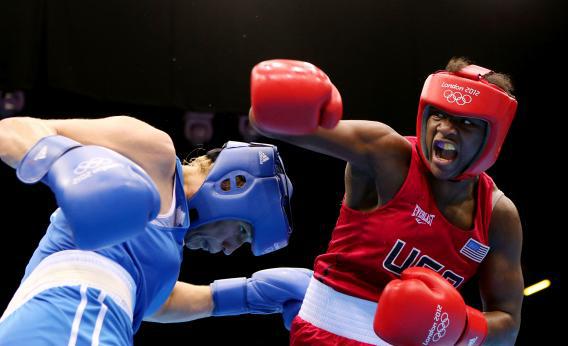In the middle of her fight for boxing gold, Claressa Shields bobbed her head left and right, dodging a series of punches from Russia’s Nadezda Torlopova. The 17-year-old middleweight from Flint, Mich., then made a move equal parts fighter and teenager. Just as Sugar Ray Leonard used to do, Shields stuck out her tongue. She was mocking the Russian, and there was nothing Torlopova could do about it. Clad in red, clench-jawed, and as unyielding as the name of her hometown, Shields went to town, connecting more blows and showing more energy throughout the four-round clash. The American was too tough and too fast, and she wasn’t going to lose.
Though her margin of victory wasn’t as large as in the semifinals, the teenage star still managed to make history in winning the fight 19-12. Shields, who was profiled extensively in the months leading up to her London showdown, is the second-youngest Olympic boxer to win a gold medal, the first woman boxer to win an Olympic middleweight competition, and perhaps the most intimidating American woman in the history of the games.
American boxing fans pinned their hopes on Shields after flyweight Marlen Esparza lost her semifinal bout. They’d already given up on the men’s team, which will leave the Olympics empty-handed for the first time ever. (Could it be that “the worst jab that can be leveled on America’s playgrounds today is that one fights like a guy?” asked the New York Times). But Shields’ win represents a victory for more than just the red, white, and blue. As a woman in an intensely physical, aggressive sport, she’s a standard bearer for radical female athleticism. She’s not cutesy (like some gymnasts) or sexy (like some—OK, all—beach volleyball players). She’s strong and ferocious and confrontational—yes, she broke into the Dougie right before her title was announced, but “Baby Robinson” shows few other signs of messing around. And like all great boxers, she’s outrageously cocky, her deep reserves of self-confidence written all over her face.
Shields’ victory signifies that we’ve left the era in which women’s boxing can be dismissed as an uncouth sideshow. The case against the sport goes that ladies are too precious to put at risk of injury—and that allowing them into the ring would be a sign of disrespect. (Combat sports, coach Tommy Gallagher explained to the New Yorker’s Ariel Levy, are modeled after the fighting our ancestral forefathers did to protect our ancestral foremothers.) Yet for Shields, boxing means proving her worth, not discounting it. She walked into the ring for the first time because her father told her that “boxing is a man’s sport”; she was determined to prove him wrong. Her aunt Tammy Rutherford-Maynard revealed in Levy’s New Yorker piece that Caressa takes after the other Shields women: “All the ladies in the family, you can’t tell us we can’t do that. Whatever you can do, we can do it, too.”
Sure enough, Shields did it today. And anyone who watched her perfectly self-possessed performance shouldn’t be surprised to see her do it again and again.
